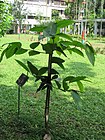Note: This is a project under development. The articles on this wiki are just being initiated and broadly incomplete. You can Help creating new pages.
Difference between revisions of "Dipterocarpus turbinatus"
| Line 1: | Line 1: | ||
[[File:Dipterocarpus turbinatus (Garjan) seedling in RDA, Bogra 03.jpg|thumb|right]] | [[File:Dipterocarpus turbinatus (Garjan) seedling in RDA, Bogra 03.jpg|thumb|right]] | ||
| + | '''Dipterocarpus turbinatus''' is a deciduous tree. Usually grows upto 35 - 50 metres tall. The straight, cylindrical bole can be up to 150cm in diameter and free of branches for two thirds of the tree's height. | ||
==Uses== | ==Uses== | ||
| − | {{Uses|}}, {{Uses|}}, {{Uses| | + | {{Uses|Ulcers}}, {{Uses|Ring worms}}, {{Uses|Skin infections}}. |
==Parts Used== | ==Parts Used== | ||
| Line 16: | Line 17: | ||
===Dravya=== | ===Dravya=== | ||
===Rasa=== | ===Rasa=== | ||
| − | |||
===Guna=== | ===Guna=== | ||
| Line 29: | Line 29: | ||
==Habit== | ==Habit== | ||
| − | {{Habit|}} | + | {{Habit|Deciduous tree}} |
==Identification== | ==Identification== | ||
| Line 48: | Line 48: | ||
==Mode of Propagation== | ==Mode of Propagation== | ||
| − | {{Propagation|}} | + | {{Propagation|Seeds}} |
==How to plant/cultivate== | ==How to plant/cultivate== | ||
| − | <ref name="How to plant/cultivate"/> | + | A plant of the moist tropics. It grows best in areas where annual daytime temperatures are within the range 24 - 32°c, though it can tolerate 10 - 40°c.<ref name="How to plant/cultivate"/> |
==Commonly seen growing in areas== | ==Commonly seen growing in areas== | ||
| − | {{Commonly seen|}}, {{Commonly seen|}}, {{Commonly seen| | + | {{Commonly seen|Mixed deciduous forest}}, {{Commonly seen|Evergreen forest}}, {{Commonly seen|Semi-evergreen forest}}. |
==Photo Gallery== | ==Photo Gallery== | ||
| Line 64: | Line 64: | ||
<references> | <references> | ||
| − | <ref name="chemical composition">[ | + | <ref name="chemical composition">[Chemistry]</ref> |
| − | <ref name="Leaf">[ | + | <ref name="Leaf">[Morphology]</ref> |
| − | <ref name="How to plant/cultivate">[ | + | <ref name="How to plant/cultivate">[http://tropical.theferns.info/viewtropical.php?id=Dipterocarpus+turbinatus Cultivation]</ref> |
<ref name="Uses">Indian Medicinal Plants by C.P.Khare</ref> | <ref name="Uses">Indian Medicinal Plants by C.P.Khare</ref> | ||
</references> | </references> | ||
==External Links== | ==External Links== | ||
| − | * [ ] | + | * [https://www.flowersofindia.net/catalog/slides/Garjan.html Dipterocarpus turbinatus on flowersofindia.net] |
| − | * [ ] | + | * [https://indiabiodiversity.org/species/show/227020 Dipterocarpus turbinatus on indiabiodiversity.org] |
| − | + | ||
[[Category:Herbs]] | [[Category:Herbs]] | ||
[[Category:Pages without herbs images]] | [[Category:Pages without herbs images]] | ||
Revision as of 18:37, 28 April 2020
Dipterocarpus turbinatus is a deciduous tree. Usually grows upto 35 - 50 metres tall. The straight, cylindrical bole can be up to 150cm in diameter and free of branches for two thirds of the tree's height.
Contents
- 1 Uses
- 2 Parts Used
- 3 Chemical Composition
- 4 Common names
- 5 Properties
- 6 Habit
- 7 Identification
- 8 List of Ayurvedic medicine in which the herb is used
- 9 Where to get the saplings
- 10 Mode of Propagation
- 11 How to plant/cultivate
- 12 Commonly seen growing in areas
- 13 Photo Gallery
- 14 References
- 15 External Links
Uses
Ulcers, Ring worms, Skin infections.
Parts Used
[[:Category:Herbs with used in medicine|]], stem, leaves, Root.
Chemical Composition
Common names
| Language | Common name |
|---|---|
| Kannada | |
| Hindi | |
| Malayalam | |
| Tamil | |
| Telugu | |
| Marathi | |
| Gujarathi | |
| Punjabi | |
| Kashmiri | |
| Sanskrit | |
| English |
Properties
Reference: Dravya - Substance, Rasa - Taste, Guna - Qualities, Veerya - Potency, Vipaka - Post-digesion effect, Karma - Pharmacological activity, Prabhava - Therepeutics.
Dravya
Rasa
Guna
Veerya
Vipaka
Karma
Prabhava
Habit
Identification
Leaf
| Kind | Shape | Feature |
|---|---|---|
Flower
| Type | Size | Color and composition | Stamen | More information |
|---|---|---|---|---|
| {{{5}}} |
Fruit
| Type | Size | Mass | Appearance | Seeds | More information |
|---|---|---|---|---|---|
Other features
List of Ayurvedic medicine in which the herb is used
Where to get the saplings
Mode of Propagation
How to plant/cultivate
A plant of the moist tropics. It grows best in areas where annual daytime temperatures are within the range 24 - 32°c, though it can tolerate 10 - 40°c.[3]
Commonly seen growing in areas
Mixed deciduous forest, Evergreen forest, Semi-evergreen forest.
Photo Gallery
References
- ↑ [Chemistry]
- ↑ [Morphology]
- ↑ Cultivation
Cite error: <ref> tag with name "Uses" defined in <references> is not used in prior text.
External Links
- Pages with reference errors
- Ayurvedic Herbs known to be helpful to treat Ulcers
- Ayurvedic Herbs known to be helpful to treat Ring worms
- Ayurvedic Herbs known to be helpful to treat Skin infections
- Herbs with used in medicine
- Herbs with stem used in medicine
- Herbs with leaves used in medicine
- Herbs with Root used in medicine
- Habit - Deciduous tree
- Index of Plants which can be propagated by Seeds
- Herbs that are commonly seen in the region of Mixed deciduous forest
- Herbs that are commonly seen in the region of Evergreen forest
- Herbs that are commonly seen in the region of Semi-evergreen forest
- Herbs
- Pages without herbs images

